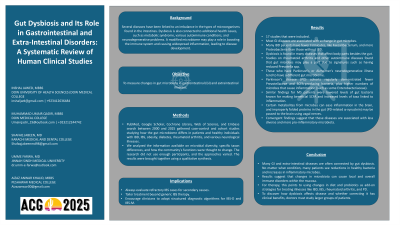Monday Poster Session
Category: Colon
P2415 - Gut Dysbiosis and Its Role in Gastrointestinal and Extra-Intestinal Disorders: A Systematic Review of Human Clinical Studies


Inshal Jawed, MBBS
Dow Medical College
Karachi, Sindh, Pakistan
Presenting Author(s)
1Dow Medical College, Karachi, Sindh, Pakistan; 2Indiana University Southwest Internal Medicine Residency Program, Evansville, IN; 3Karachi Medical and Dental College, Karachi, Sindh, Pakistan; 4Jinnah Sindh Medical University, Karachi, Sindh, Pakistan; 5Peshawar Medical College, Karachi, North-West Frontier, Pakistan; 6Indiana University School of Medicine, Vincennes, IN
Introduction: Several diseases have been linked to an imbalance in the types of microorganisms found in the intestines. Dysbiosis is also connected to additional health issues, such as metabolic syndrome, various autoimmune conditions, and neurodegenerative problems. A modified microbiome may play a role in boosting the immune system and causing widespread inflammation, leading to disease development.
Methods:
We systematically reviewed studies on gut microbiota changes in GI and extraintestinal diseases. Searches of PubMed, Google Scholar, Cochrane Library, Web of Science, and Embase (2000–2025) identified case-control and cohort studies comparing the gut microbiome in patients vs. healthy controls with IBD, IBS, obesity, diabetes, rheumatoid arthritis, and neurological disorders. We examined microbial diversity, taxonomic shifts, and functional changes. Due to small sample sizes and varied methodologies, findings were synthesized qualitatively.
Results:
Our search yielded 17 studies. Most GI diseases involve altered gut microbiota; for example, IBS patients often have lower microbial diversity and fewer beneficial bacteria. IBD patients typically show reduced Firmicutes (e.g. Faecalibacterium) and increased Proteobacteria. Dysbiosis is also linked to non-GI conditions. In autoimmune diseases like rheumatoid arthritis, reduced Prevotella spp. is common. Patients with Parkinson’s or Alzheimer’s often show distinct microbiomes, with PD cohorts having fewer SCFA-producing bacteria (e.g., Prevotellaceae) and more pro-inflammatory microbes (e.g. Enterobacteriaceae). Similarly, MS patients show reduced beneficial SCFA-producing taxa and increased inflammatory microbes. Microbial metabolites may reduce brain inflammation, while misfolded gut proteins (like α-synuclein) may reach the brain via the vagus nerve. These findings suggest these diseases share a pattern of reduced diversity and increased pro-inflammatory microbiota.
Discussion:
Gut dysbiosis is common across many GI and extra-intestinal diseases, marked by reduced beneficial bacteria and increased inflammatory microbes. While the exact cause remains unclear, these shifts may trigger local and systemic immune dysfunction. This supports using diet and probiotics as adjunct therapies for conditions like IBD, IBS, rheumatoid arthritis, and Parkinson’s. Larger studies are needed to clarify dysbiosis's role and the potential benefits of correcting it.
Disclosures:
Inshal Jawed, MBBS1, Muhammad YN. Chaudhary, MBChB2, Muhammad Umair Qadir, MBBS1, Shafaq Jabeen, MD3, Umme Farwa, MD4, Aizaz Anwar Khalid, MBBS5, Oluwagbenga Serrano, MD, FACG6. P2415 - Gut Dysbiosis and Its Role in Gastrointestinal and Extra-Intestinal Disorders: A Systematic Review of Human Clinical Studies, ACG 2025 Annual Scientific Meeting Abstracts. Phoenix, AZ: American College of Gastroenterology.
